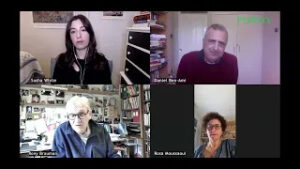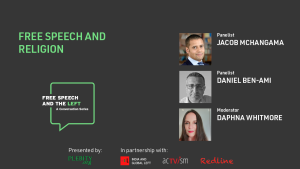
1948 Nescafe ad–Public domain
“Sometimes language should hurt as much as the circumstances as it denotes; otherwise it is false to the realities it names.” Left is not Woke by Susan Neiman
Speech is not violence
One of the hallmarks of today’s woke left is to conflate speech with violence. Fearful of the ‘harm’ that might be experienced from hearing certain words, the woke left has become widely confused about the issue of free speech in general and between speech and literal, physical violence.
In New Zealand this week, Posie Parker was assaulted as she tried to speak–a mob surrounded her and forced her off the stage and ultimately out of the country. The group that prevented her from speaking has taken to social media to declare a great victory.
Why it is important to understand the difference between using violence to censor speech and using speech as a weapon against state violence
In sharp distinction with this pathetic struggle to silence one woman’s voice is the monumental social struggle going on right now in France. There is a battle being played out in the media, on the streets and within the government–where free speech is the most crucial weapon in the arsenal of those who challenge power.
People across the country have taken to the streets to express their opposition to a policy which is ostensibly about raising the retirement age but which is, in reality, no less than the continuation of an ongoing neo-liberal project to transfer wealth from the bottom layers of society upwards.
Popular anger over this ‘reform’ reached fever pitch when the government recently employed a rarely used non-democratic maneuver to push it through without a vote.
Austerity policies, such as the raising of the retirement age, are the slow boil of state violence being perpetrated against its citizens.
From time to time, and to the genuine dismay of those in power, the victims being boiled jump out of the kettle and pour into the streets, as they are now doing in France.
Speech raised against state violence is a genuine challenge to power
When people raise their voices in this way, it is a serious threat to the established power. We know this just from looking at the level of force deployed to suppress them. Police violence against protesters in France is at levels that are completely off the charts. It represents a calculated government strategy to instill fear and keep people off the streets—to silence them.
When violent demonstrators surround a single woman trying to speak, make her fear for her life and prevent her from speaking, power does not shake in its boots. On the contrary, this comforts power and does its work. It divides people based on identity, and diverts their anger over material issues of inequality and injustice in directions that are completely harmless to the status quo.
The heckler’s veto is not free speech–it is violence being used to suppress speech
It has come to a sorry day, indeed, when self-described leftists want to suppress speech that “hurts feelings” or that might cause harm in some nebulous future. In effect this reverses the hard-won struggles by the Left (in conjunction with civil libertarians) to curb government interference with political speech. –Norman Finkelstein
The heckler’s veto is widely misunderstood as a form of counterspeech, in some way equivalent to the speech it is trying to censor.
In the US, the First Amendment does not consider the heckler’s veto as protected free speech. Nadine Strossen points out not only that “…[T]he heckler’s veto violates the speaker’s First Amendment free speech rights..” but that it also “..violates the First Amendment rights of audience members who want to hear that unpopular message.”
The heckler’s veto may momentarily shut down an individual speaker. But, as in the case of Posie Parker, it is likely to actually amplify their message by bringing it to the attention of a much wider audience. Perhaps the heckler’s veto has a certain cathartic value for those who use it. But it is both morally wrong from a free speech point of view and ineffective as a tactic.
The mob that assaulted Posie Parker left with a satisfied sense of righteousness and of having done the right thing. In reality they discredited their cause and broadcast Posie Parker’s message to thousands who would otherwise never have heard of her.
Is it tolerant – does it represent the values you claim to espouse?
Bullying a speaker into silence, even when you find their words reprehensible, is a version of the ‘ends justify the means’ thinking. In this case, it means using censorship in protection of presumably just goals. Claims that a goal of righteousness excuses all bad behavior used to achieve it has been the poison pill of leftist struggle time and time again. It allows totalitarianism to mask itself as tolerance and oppression to label itself as liberation.
How many historical examples do we need to induce a little humility before asserting that we occupy some unique position of truth?
“Positioning oneself on the right side of history before History has rendered its verdict, it’s a tricky business.” –Norman Finkelstein
In France, state violence is being deployed to suppress the voices of angry, frustrated people who are threatening the foundations of power. In New Zealand, a woman was pushed off stage and told to shut up.
The woke left serves the same purpose as ersatz coffee, it exists to keep people from thinking about the real thing.



